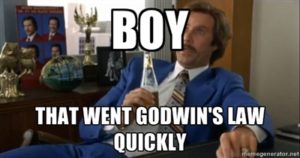Memes dictionary
Godwin’s law
or Godwin’s rule or Hitler analogies [god-winz law]
What does Godwin's law mean?
Godwin’s law is the proposition that the longer an internet argument goes on, the higher the probability becomes that something or someone will be compared to Adolf Hitler.
Related words:
- hitler
- Arken’s law
- Markley’s law
- Poe’s law
- playing the Nazi card
Where does Godwin’s law come from?

Sometimes called Godwin’s rule of Hitler analogies, Godwin’s law is the facetious proposition that the longer any online conversation (or argument) goes on, the greater the likelihood that something will be compared to Hitler. Godwin’s law is an update of the logical fallacy reductio ad Hitlerum, modern Latin for “reduction to Hitler” and a take on reductio ad absurdum. The reductio ad Hitlerum, or “playing the Nazi card,” was coined by philosopher Leo Strauss in 1951. The principle describes the act of discrediting an opponent’s view by comparing it to something supported by Hitler or Nazism. The move is seen as a sign of desperation or intellectual laziness, as one could “invalidate” food because if Hitler ate food and Hitler was genocidist, then food can’t be good.

Know Your Meme
Godwin’s law was created by, and named for, attorney Mike Godwin. In 1990, Godwin claims to have become exasperated by the level of Nazi comparisons that occurred in internet debates, to the point he felt every argument online would devolve to a Hitler comparison. Viewing the phenomenon as an early meme, Godwin set out to create a “counter-meme,” Godwin’s Law, originally formulated as so: “as an online discussion grows longer, the probability of a comparison involving Nazis or Hitler approaches one.” Over the next year, Godwin continued seeding his counter-meme into various online message boards, and by 1991 it was gaining recognition outside of him.
Godwin’s law is a rare meme with an explicit creator; Godwin has written about his “law” for publications like The Washington Post and Wired. According to Google Trends, lookups of the phrase peaked around the 2008 and 2016 US presidential elections, perhaps due to all the political arguments (and if Godwin’s right, Hitler comparisons) taking place online.
Examples of Godwin’s law
Who uses Godwin’s law?
Godwin’s law is invoked in many online debates, but it is most often called upon during political arguments when hot-button issues draw Nazi comparisons.

Whale Oil
Mike Godwin, for his part, has asserted that Hitler comparisons tend to be lazy in a debate. He is quick to clarify, though, that Godwin’s law isn’t formal or scientific but rhetorical and pedagogical: “I wanted folks who glibly compared someone else to Hitler or to Nazis to think a bit harder about the Holocaust.” That said, Godwin stipulates that he doesn’t think Hitler comparisons should always be off the table, just that their relevance should be considered carefully. In 2015, he wrote, “If you’re thoughtful about it and show some real awareness of history, go ahead and refer to Hitler or Nazis when you talk about Trump. Or any other politician.” He also pointed out that he saw no problem with comparing the 2017 Charlottesville white nationalist ralliers to Nazis.
By all means, compare these shitheads to Nazis. Again and again. I’m with you.
— Mike Godwin (@sfmnemonic) August 14, 2017
Note
This is not meant to be a formal definition of Godwin’s law like most terms we define on Dictionary.com, but is rather an informal word summary that hopefully touches upon the key aspects of the meaning and usage of Godwin’s law that will help our users expand their word mastery.